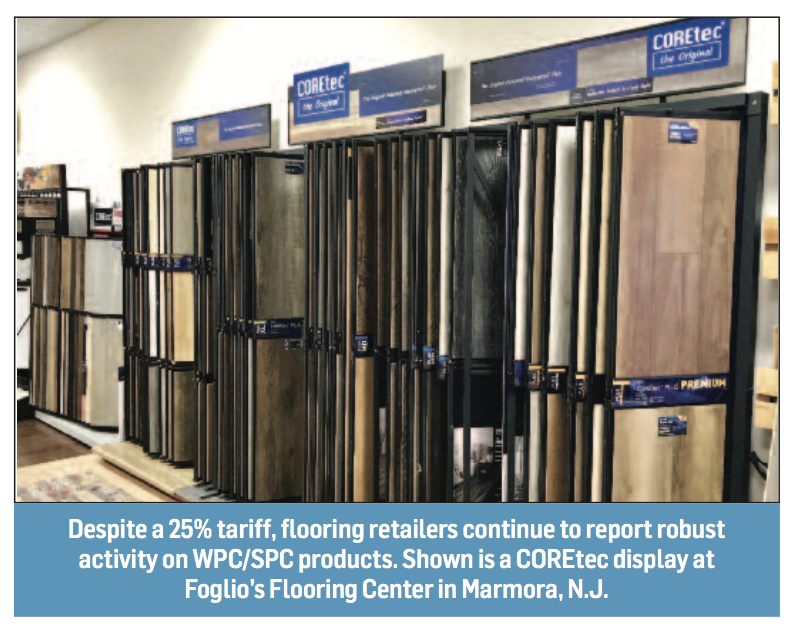By Ken Ryan
 Flooring manufacturers are working closely with their supply chain partners to effectively work through the 25% tariff on Chinese imports, including flooring products like rigid core vinyl, engineered hardwood and ceramic tile.
Flooring manufacturers are working closely with their supply chain partners to effectively work through the 25% tariff on Chinese imports, including flooring products like rigid core vinyl, engineered hardwood and ceramic tile.
Nearly six weeks since the full 25% tariff took effect, executives say they continue to see strong activity in the red-hot multi-layer flooring market even as they work with retailers and supply partners on minimizing the impact. “Shaw has been very proactive and clear with its customers about what has been transpiring with regard to price increases during unprecedented times,” Tim Baucom, president of Shaw Industries, told FCNews. “We are dealing with something we have not dealt with before.”
The initial 10% tariff imposed on Chinese goods that included many flooring products took effect on Sept. 14, 2018. On May 9, 2019, a 25% tariff (a 15% increase from the original 10%) was announced, with an effective date of products entering the U.S. on or after June 1. However, on May 31, an extension was issued by the Office of the United States Trade Representative (USTR) changing the effective date from June 1 to June 15. Baucom said Shaw has been paying the 25% tariff on imported goods since June 15.
Piet Dossche, president of USFloors and executive vice president, hard surfaces for Shaw Industries, said the company is working diligently with its supply partners in China to find ways to mitigate the 15% increase as much as possible while passing on the absolute minimum possible. “Basically, we are looking at a 7% or 8% increase to our retailers,” he explained.
Dossche said flooring retailers he spoke to at the recent Carpet One convention in Aurora, Colo., said the tariff was a non-issue. “They understand it, they accept it. I don’t say they like it, but they pass it on and let that be the end of it,” he explained.
Dealers who spoke to FCNews said, for the most part, the tariffs have not hurt their business, especially in the still robust WPC/rigid core sub-segment. “The tariffs have not really impacted our business as far as I can tell, as consumers still go to the vinyl plank and tile category,” said Craig Phillips, president of Barrington Carpet & Flooring Design and Carpet Country, Akron, Ohio. “We are hoping to see a trade deal and cost reduction moving forward, but for now the tariffs do not seem to have taken consumers out of the market.”
Adam Joss, co-owner of The Vertical Connection Carpet One Floor & Home in Columbia, Md., said the tariffs to date have not negatively impacted his business, either. “We’re also stocking more, which is helping us manage cost better,” he explained.
Steve Weisberg, president of Crest Flooring in Allentown, Pa., said during the latest 15% tariff increase to the present 25%, most of his suppliers only increased costs in the LVT category by about 8%—something he is thankful for. “I don’t see the category being hurt too much,” he said. “We like that our suppliers marginalized the increase to keep the selling price close to where it was.”
Perry Coker, CEO of CFL Flooring North America, said while there is no way adding a 25% cost is a positive, he does see a silver lining. “Most of the larger suppliers from China worked with their customers to minimize the impact, basically through finding efficiencies that they could pass along. So, the total impact of 25% tariffs have probably resulted in actual landed cost increases of 10%-15% in general.”
The bottom-line takeaway, Coker added, is a 10% to 15% increase is very manageable. “It was not that long ago when the vinyl industry had 4%-5% price increases almost every year, but that pretty much faded in the past decade,” he explained. “Moreover, much of the innovation in the vinyl industry continues to come out of China, and that is important to remember as well. Cool new things get customers’ feet in the door and helps to increase the replacement cycle rate.”
The fact that flooring is an infrequent purchase might help mitigate the impact of a 25% tariff, executives say. Some of whom suggest most consumers do not know the cost of a typical rigid core product and, therefore, would not be dissuaded from purchasing an SPC that met their needs—even at a slight premium.
Indeed, many executives say the solutions this segment offers outweigh any tariff increase. As Dossche noted, “Consumers won’t trade down [from WPC/SPC]; they are not going from an iPhone 10 to a flip phone. They love the features and benefits and will continue to purchase the products.”
